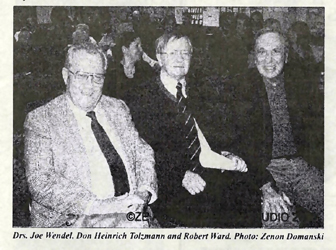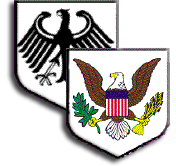Articles and Reviews
"A German-American Kulturabend," By Dr. Joe Wendel
Germania (December 2010)
The Department of Foreign Languages and Literatures at Baldwin-Wallace College sponsored an exceptional Kulturabend on Friday, November 12, 2010. The Strosacker College Union lecture hall was filled to capacity. More than 135 guests were in attendance from all over the Greater Cleveland area, including German teachers and their students, Civil War re-enactors, history buffs and people interested in German-American heritage.
 The keynote speaker was Dr. Don Heinrich Tolzmann, a distinguished recipient of numerous awards for his works on German-American history. He has authored many books, including The German-American Experience. A revised and expanded edition of Theodore Huebener’s The Germans in America and is a contributing editor to German Life magazine. Dr. Tolzmann is the proud recipient of the Verdienstkreuz 1. Klasse (the Service Cross of Merit) from Germany and also the Ohioana Book Award.
The keynote speaker was Dr. Don Heinrich Tolzmann, a distinguished recipient of numerous awards for his works on German-American history. He has authored many books, including The German-American Experience. A revised and expanded edition of Theodore Huebener’s The Germans in America and is a contributing editor to German Life magazine. Dr. Tolzmann is the proud recipient of the Verdienstkreuz 1. Klasse (the Service Cross of Merit) from Germany and also the Ohioana Book Award.
For many years Dr. Tolzmann served as president of the Society for German-American Studies. In that capacity he called for the celebration of the German-American Tricentennial in 1983. The late Jack Wiewel was appointed by the governor to coordinate this state-wide celebration. The Cleveland celebration and elsewhere provided cause to stand a little taller and be more proud of our heritage. Dr. Robert E. Ward, who served as vice-president of the Stadtverband in Cleveland prepared a commemorative booklet for this occasion, describing the many German-American contributions to Greater Cleveland and Ohio.
Dr. Tolzmann tirelessly led the national campaign to establish October 6 as national German-American Day. This effort earned him the title of “Father of German-American Day.” He also received the German-American of the Year Award and the Outstanding Achievement Award of the Society for German-American Studies. Presently Dr. Tolzmann serves as president of the German-American Citizens League of Greater Cincinnati and also as curator of the German Heritage Museum.
This beautiful evening would not have been so enthusiastically received without weeks and months of meticulous preparation by Dr. Stephen Hollander, professor of German at Baldwin-Wallace and his fine group of students. Professor Hollander motivated his students to take “ownership” in the Kulturabend, turning it into a total educational and cultural experience.
Two BW German majors appeared with Dr. Hollander on the local NPR German-American radio show, both to promote the event and talk about studying German at BW. Students took it upon themselves to create informative and very beautiful posters depicting notable German-Americans and their contributions. Included in this display of luminaries were Werner von Braun and our space exploration, Johann Roebling and the Brooklyn Bridge, Friedrich von Steuben and our struggle for independence from England, generals Carl Schurz and Dwight D. Eisenhower, the Turners, and Kindergarten in America. These colorful posters were displayed all around the lecture hall. The students were present to answer questions about them. Some schools asked to borrow these posters for showings at their school.
Students in the advanced commercial German course were challenged with an assignment of producing a website and a video commercial promoting the study of German at Baldwin-Wallace College. This was shown to and well received by an enthusiastic audience. Many asked for a link to the commercial. The Kulturabend provided a learning opportunity far beyond the lecture itself. Professor Hollander and his students have earned our praise and deserve our gratitude for sponsoring a most enjoyable and enlightening evening.
Two Baldwin-Wallace music majors set a majestic tone and mood for the evening. Aaron Dunn sang Schumann’s “Die beiden Grenadiere.” The audience rewarded their superior performance with a huge applause.
Dr. Tolzmann’s much anticipated lecture was enhanced with PowerPoint visual assistance. Reflecting back to the founding of German Wallace College, he combined the significant northeast Ohio German-American contributions in our own Civil War with events in Germany, such as the failed 1848 Revolution in Germany. Dr. Tolzmann stressed the overwhelming German-American support for President Lincoln and why so many of the “Dutch Devils,” as the Confederates referred to the German-American Yankees, fought to preserve the Union. Robert E. Lee is quoted as stating: “Take the Dutch out of the Union Army and we could whip the Yankees easily.” It was mentioned that Lincoln’s grandfather, spelled his last name “Linkhorn.”
The leaders of the failed Revolution of 1848 had little choice but to leave as inconspicuously as possible. Germany’s loss was America’s gain. Among the individuals that Dr. Tolzmann talked about was Jakob Mueller, who came to America after participating in the Revolution of 1848. Arriving in Cleveland around 1849, he became a successful lawyer and supporter of the newly formed Republican Party. He was politically engaged and served as Lt. Governor of Ohio. In 1852, he co-founded the German newspaper, the Waechter, and he was a delegate in the 1860 Republican convention that nominated Lincoln for president. Both Mueller and his newspaper strongly supported the Union cause.
Wilhelm Kaufmann came to America in 1868. He first settled in Cincinnati where he worked on the staff of a German-American newspaper. German-American newspapers were the second most numerous papers in the U.S. In 1877, Kaufmann moved to Cleveland where he acquired the Cleveland Anzeiger, which was a major publication. In 1889, he purchased and merged it with the Waecher am Erie. The newspaper was called the Waechter und Anzeiger.
The 1892 Jubilee Edition of the Cleveland Waecher und Anzeiger included a feature article entitled “German Fighters for the Cause of the Union.” It stated: “The outbreak of the Civil War was the magic word which dissolved the bonds of partisanship for the Germans of Ohio and joined them together in patriotism, a patriotism expressed not simply in words but in deed.”
German-Americans always followed the call to duty to defend their beloved land of the brave and the free. Dr. Tolzmann pointed out two important factors why the German-American involvement was so critical in the outcome of the Civil War. First, many West Point officers followed Robert E. Lee and were sympathetic to the Confederate cause. And, secondly, the 1848ers came with military experience and know-how that the Union Army needed.
Ohio had sixteen regiments comprised totally or primarily of German-Americans, five from northern Ohio. The 7th Regiment carried a banner from the Cleveland Turnverein. The Waechter und Anzeiger took special pride in the valor the Turner Company had displayed in the Civil War. They suffered great losses at the Battle of Ringold, Georgia, in November 1863, losing fifty percent of its troops within the first half hour of the battle.
The 37th Infantry Regiment included German-Americans not only from Cleveland, but also from Toledo, Sandusky and northern Ohio. Many members of the various Cleveland Gesangvereine (singing societies) joined its ranks. This regiment was involved in all the battles around Atlanta, on the March to the Sea and northwards. The 37th was commanded by Col. Siber who was described as “one of the best swords Germany ever gave to America.” General Sherman called him “the best-trained officer of his army.” The regiment took part in Sherman’s famous March through Georgia.
Other regiments primarily comprised of German-Americans were the 20th, the 107th and the 3rd Ohio Cavalry. German-American regiments played a decisive role in preserving the Union. The 107th suffered 400 casualties at the Battle of Gettysburg. The settlement was first called Goetzburg. One-third of all soldiers in the Civil War, as in all our wars, were German-American.
Another notable 1848er was Gustav Weber. He and Carl Schurz were fellow students at the University of Bonn. They both took part in the 1848 Revolution and both came to America. In 1856, Dr. Weber took a position at the Cleveland Medical College and was appointed surgeon-general of Ohio by the governor when the war broke out.
The Kulturabend was both informative and entertaining. Dr. Tolzmann cheerfully shared his wealth of information and made history and the Civil War come alive. Anyone interested in learning more about German-Americans in our Civil War is directed to reading The Cincinnati Germans in the Civil War by Gustav Tafel, translated and edited with supplements on Germans from Ohio, Kentucky, and Indiana in the Civil War by Dr. Don Heinrich Tolzmann.
Special thanks go to Dr. Stephen Hollander, his students and Baldwin-Wallace College. The program was free, as was “Kaffee und Kuchen” that was served after the lecture. Dr. Hollander expressed his hopes that this shall be the firstd of many annual Evenings of German Kultur and History at Baldwin-Wallace College.
From: Germania (December 2010).
